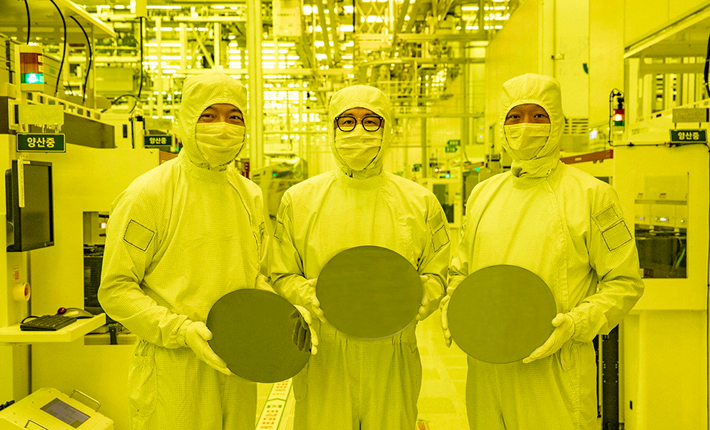The world’s largest memory chip maker, Samsung Electronics, issued an upbeat outlook on Tuesday after reporting a 10-fold rise in first-quarter operating profit.
Shares of the South Korean tech giant rose 1.8% in early trading after it joined rivals in seeing a solid rebound in the battered global memory chip market.
The group forecast demand for artificial intelligence would hold strong and tighten supply of some high-end chips.
ALSO SEE: China Plenum in July Aims to Modernise, Reform Economy
But so far this year Samsung shares are down 0.8%, lagging SK Hynix’s 24% gain, as it seeks to catch up with its smaller rival in the supply of top-end chips such as high bandwidth memory (HBM) to AI leader Nvidia.
Plans First 12-Layer 3D-TSV Chip
“We plan to increase supply of HBM-related chips in 2024 by more than three-fold versus last year,” Jaejune Kim, a Samsung vice president in charge of the memory division, said on an earnings call.
Samsung said it began mass production this month of the latest HBM chips for use in generative AI chipsets, called 8-layer HBM3E.
It is seeking to capitalise on the AI boom that has benefited SK Hynix, which had been the sole supplier of HBM3 chips to Nvidia.
Samsung said it planned to start making a 12-layer version – known as a 3D-TSV (Through Silicon Via) technology – during the second quarter.
And it expected the latest HBM3E products to account for two-thirds of its HBM output by year-end.
Analysts said the targets were aggressive.
Samsung’s 8-layer HBM3E appears to be supplying Nvidia, while the 12-layer may go to AMD and Nvidia, Jeff Kim, head of research at KB Securities, said.
“As Samsung’s technology is advantageous for high-stacking, while SK Hynix has its advantages in the 8-layer, there may be a segmentation where Nvidia gets 12-layer products from Samsung and most 8-layer products from SK Hynix,” Kim said.
“Samsung is working hard to improve the yield of its 12-layer product.”
Samsung did not respond immediately to a request for comment on its HBM customers.
Samsung also said it will step up offerings of high-end solid-state drive (SSD) products to meet AI server demand, and expected high-end memory chip supply to become tighter toward year-end due to capacity being focused on HBM, echoing comments from SK Hynix last week.
Q1 revenue tops $52 billion
The South Korean company’s first-quarter revenue rose 13% to 71.9 trillion won ($52.14 billion), including a 96% increase in memory chip revenue to 17.49 trillion won as prices rose steeply from a severe downturn, partly thanks to the boom in AI.
Operating profit rose to 6.6 trillion won in January-March, up from 640 billion won a year earlier. It was the company’s highest operating profit since the third quarter of 2022.
The chip division, historically Samsung’s cash cow business that used to account for two-thirds of its operating profit, swung to a profit of 1.91 trillion won in the March quarter from a 4.58 trillion won loss a year earlier. It was the first profit since the third quarter of 2022.
Prices of NAND flash chips used to store data increased by 23% to 28% during the first quarter versus the previous quarter, while prices of DRAM chips used in tech devices rose by about 20%, according to data provider TrendForce.
Reclaims title as world’s top smartphone vendor
Samsung’s mobile devices business booked a 3.51 trillion won operating profit in the first quarter, down from 3.94 trillion won a year earlier.
It shipped about 60 million smartphones during the quarter, in line with a year earlier but retaking its title as the world’s top smartphone vendor from Apple, which is suffering a sales decline in China.
Rising costs, including increased memory chip prices, dented margins from its flagship Galaxy S24 smartphones launched during the quarter.
Samsung said AI functions were driving sales of S24 phones, allowing the division to maintain double-digit profitability in the first quarter.
About 50% of customers said they bought S24 phones for the AI functions, and 60% were regularly using the AI functions, the company said.
- Reuters with additional editing by Jim Pollard
ALSO SEE:
Global Chip Sector ‘Can Never Return to its Pre-Covid Set-up’
Samsung Poised For Nine-Fold Profit Jump Thanks to Chip Rebound
Samsung Designs Generative AI Tech, For Use in Its Devices
Samsung Set For 80% Profit Dive as Chip Glut Bites: Analysts
South Korea’s Samsung, SK Hynix Win US Chip Tech Export Waivers
Samsung to Follow Through With Cuts Despite Chip Recovery
ASML Will Not Service Some China Equipment, Outgoing CEO Hints
























